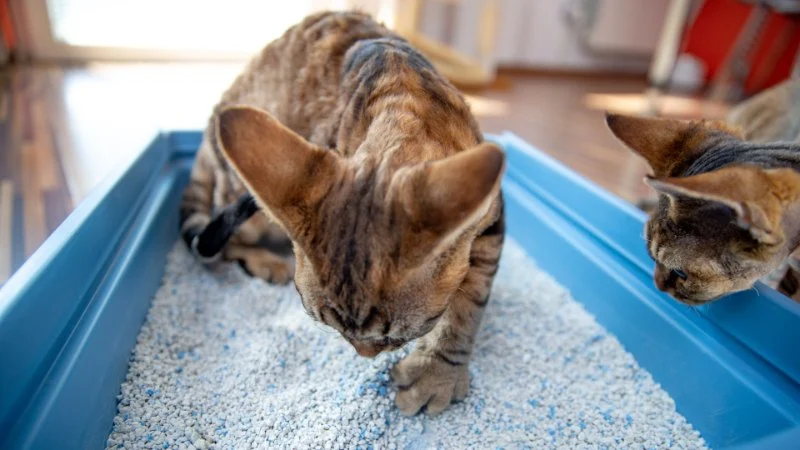
- -understanding-feline-diarrhea-#understanding-feline-diarrhea
- -common-causes-of-runny-poop-in-cats-#common-causes-of-runny-poop-in-cats
- -how-to-identify-serious-diarrhea-in-cats-#how-to-identify-serious-diarrhea-in-cats
- -treatment-options-for-cats-with-diarrhea-#treatment-options-for-cats-with-diarrhea
- -when-to-see-a-veterinarian-about-cat-diarrhea-#when-to-see-a-veterinarian-about-cat-diarrhea
- -preventing-diarrhea-in-cats-#preventing-diarrhea-in-cats
- -find-healthy-products-for-your-cat-at-omnia-pet-#find-healthy-products-for-your-cat-at-omnia-pet
Understanding Feline Diarrhea
If you've noticed that your cat's poop is runny or watery, you're likely dealing with feline diarrhea, which can be caused by a variety of factors. Diarrhea in cats can range from mild and transient to more serious conditions that require immediate attention. Understanding the causes and symptoms of diarrhea can help you determine whether it’s a minor issue or something that needs veterinary care.
Feline diarrhea occurs when a cat’s digestive system processes food too quickly, preventing proper water absorption in the colon. This leads to loose stools that can sometimes appear watery. While occasional diarrhea may not be a serious problem, persistent or severe diarrhea can be a sign of an underlying health issue that should be addressed.
Common Causes of Runny Poop in Cats
There are several common reasons why your cat might experience runny poop. Some causes are minor and can resolve on their own, while others may indicate a more serious condition. Here are some of the most frequent causes:

Golden State Corals
Los AngelesLos Angeles CountyCalifornia
6924 Canby Ave UNIT 113, Reseda, CA 91335, USA
1. Dietary Changes
Sudden changes in your cat's diet can lead to gastrointestinal upset, causing diarrhea. This could happen if you've switched brands of food or introduced new treats too quickly. Cats' digestive systems are sensitive, and any abrupt change can disrupt their gut balance.
2. Food Intolerances or Allergies
Some cats may have sensitivities to certain ingredients in their food, such as dairy, grains, or specific proteins. These food intolerances can trigger diarrhea as the cat’s body struggles to digest these ingredients properly.
3. Infections and Parasites
Infections caused by bacteria, viruses, or parasites are another common cause of diarrhea. Cats can pick up intestinal parasites like giardia or worms, leading to digestive issues and diarrhea. Bacterial infections like salmonella or viruses like feline panleukopenia can also contribute to digestive disturbances.
4. Stress
Just like humans, cats can experience stress, which can affect their digestive system. Changes in the environment, such as moving to a new home, a new pet in the household, or even changes in routine can cause stress-induced diarrhea in cats.
5. Chronic Conditions
Chronic conditions such as inflammatory bowel disease (IBD) or hyperthyroidism can lead to recurring diarrhea. These conditions affect the digestive system and can cause long-term gastrointestinal issues, including diarrhea.
How to Identify Serious Diarrhea in Cats
While occasional runny poop may not be a reason for concern, persistent or severe diarrhea can indicate a more serious health issue. It’s important to watch for additional signs that might indicate your cat’s diarrhea is more than just a mild upset.
1. Duration of Diarrhea
If your cat has diarrhea that lasts for more than a day or two, it’s important to consult a veterinarian. Persistent diarrhea can lead to dehydration and other complications.
2. Blood or Mucus in the Stool
If you notice blood or mucus in your cat’s stool, this can be a sign of infection, parasites, or more severe conditions like IBD. Blood in the stool should always be taken seriously, and your cat should be seen by a vet as soon as possible.
3. Vomiting and Lethargy
If your cat is also vomiting or appears lethargic, this could indicate a more serious illness. Vomiting combined with diarrhea can quickly lead to dehydration, which can be life-threatening if left untreated.
Treatment Options for Cats with Diarrhea
The treatment for your cat’s diarrhea depends on the underlying cause. In many cases, mild diarrhea can be managed at home, but more severe cases may require veterinary intervention. Here are some common treatment options:
1. Dietary Management
If the diarrhea is caused by a dietary issue, your vet may recommend a special diet or switching to a bland food like boiled chicken and rice for a few days. Gradual reintroduction of the regular diet can help to settle the stomach.
2. Probiotics
Probiotics can help restore the healthy bacteria in your cat’s gut, which can be beneficial if the diarrhea is due to a bacterial imbalance or after a course of antibiotics.
3. Medications
If an infection or parasites are the cause of the diarrhea, your vet may prescribe medications to treat the underlying issue. Antibiotics, anti-parasitic drugs, or even anti-inflammatory medications may be used depending on the diagnosis.
When to See a Veterinarian About Cat Diarrhea
If your cat’s diarrhea is severe, persistent, or accompanied by other symptoms like vomiting, lethargy, or blood in the stool, it’s time to see a veterinarian. Early intervention can help prevent dehydration and other complications, ensuring that your cat receives the proper care and treatment.
Preventing Diarrhea in Cats
While not all cases of diarrhea can be prevented, there are steps you can take to reduce the risk:
1. Gradual Diet Changes
Always transition your cat to new food slowly, allowing their digestive system to adjust over the course of a week. Abrupt dietary changes are a common cause of diarrhea in cats.
2. Regular Vet Check-Ups
Regular veterinary check-ups are essential for identifying any underlying health issues before they become severe. Keep up with your cat’s vaccinations and parasite control treatments.
3. Reduce Stress
Try to minimize changes in your cat’s environment to avoid stress-induced diarrhea. Providing a consistent routine and a calm environment can help keep your cat’s digestive system stable.
Find Healthy Products for Your Cat at Omnia Pet
If you’re concerned about your cat’s digestive health, visit Omnia Pet for high-quality products that support your cat’s overall well-being. From special diets to digestive supplements, we offer a range of products that can help improve your cat’s digestion and prevent issues like diarrhea.
Explore our collection today and ensure your cat stays healthy and happy!


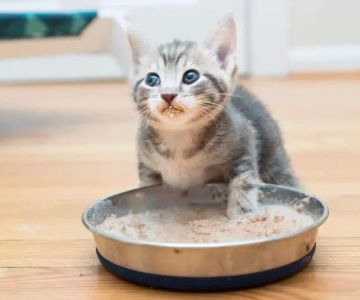
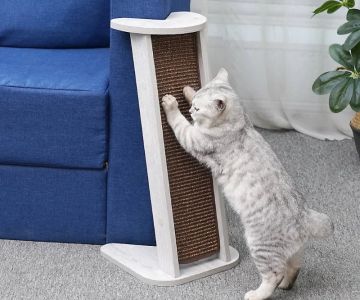
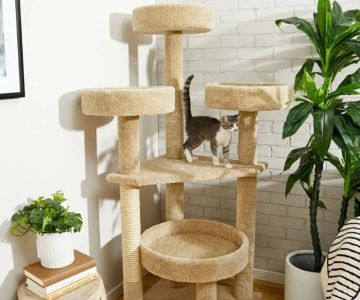

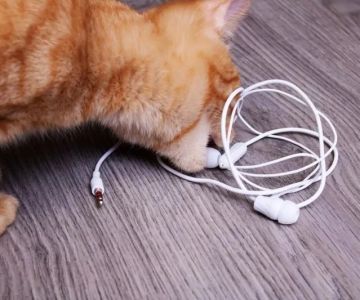
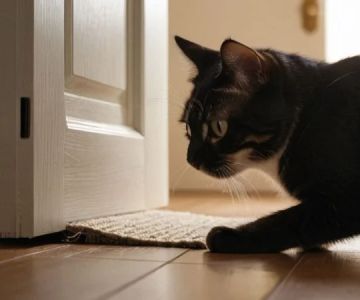
 Doggy Nibbles5.0 (1 reviews)
Doggy Nibbles5.0 (1 reviews) Petco4.0 (1336 reviews)
Petco4.0 (1336 reviews) HUB Veterinary Group4.0 (165 reviews)
HUB Veterinary Group4.0 (165 reviews) Pet Time Animal Hospital4.0 (149 reviews)
Pet Time Animal Hospital4.0 (149 reviews) Aquarium Reefers Online Store4.0 (89 reviews)
Aquarium Reefers Online Store4.0 (89 reviews) Petco4.0 (952 reviews)
Petco4.0 (952 reviews) The Best Ways to Discipline a Kitten Without Fear | Omnia Pet
The Best Ways to Discipline a Kitten Without Fear | Omnia Pet Why Is My Dog's Stomach Making Noises? Borborygmi Explained
Why Is My Dog's Stomach Making Noises? Borborygmi Explained How to Stop Your Kitten from Eating Litter Crystals: Essential Tips for Pet Owners
How to Stop Your Kitten from Eating Litter Crystals: Essential Tips for Pet Owners How to Stop Your Kitten from Chewing on Books: Proven Tips and Solutions
How to Stop Your Kitten from Chewing on Books: Proven Tips and Solutions The Best Diet for a Sphynx Kitten's Oily Skin
The Best Diet for a Sphynx Kitten's Oily Skin The Best Diet for a Birman Kitten's Blue Eyes: A Complete Guide
The Best Diet for a Birman Kitten's Blue Eyes: A Complete Guide